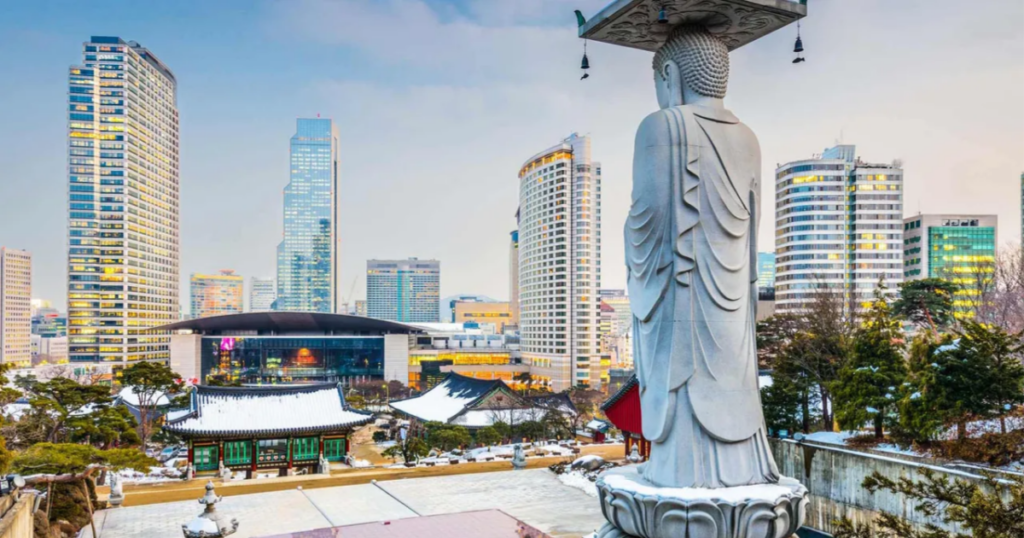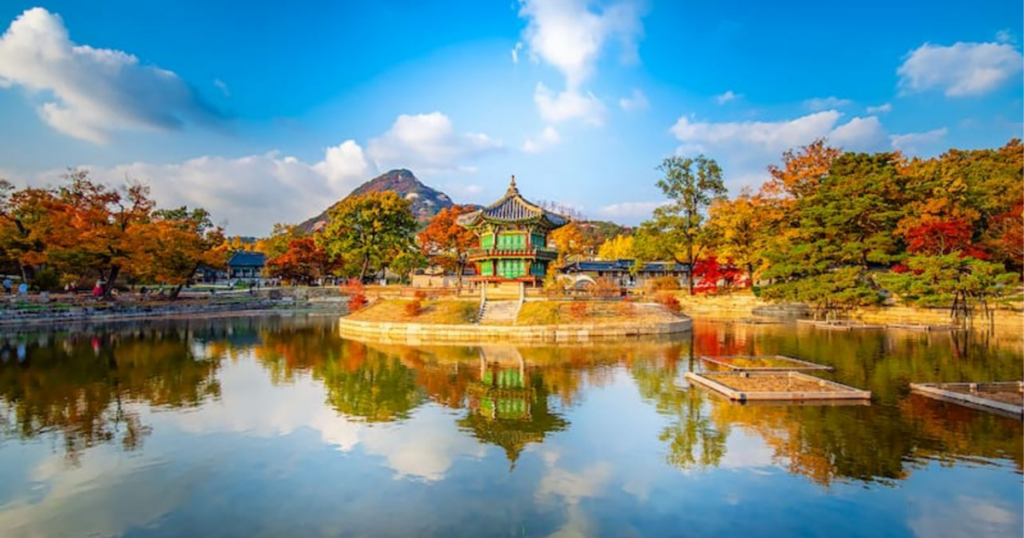Discovering the Wonders of South Korea: From Ancient Traditions to Modern Marvels
South Korea, located on the southern half of the Korean Peninsula in East Asia, is a country with a rich history and a vibrant culture. From its ancient dynasties to its modern-day technology, South Korea is a land of contrasts that is sure to captivate visitors from around the world. With bustling cities, stunning landscapes, and a delicious cuisine, South Korea is a destination that offers something for everyone. So come along on a journey to this fascinating country and discover all that South Korea has to offer.
Also Read 15 Landmarks To Visit Before You Turn 65

History Of South Korea
The history of South Korea begins with the ancient Korean kingdoms of Gojoseon, Goguryeo, Baekje, and Silla. These kingdoms were later unified by the Goryeo Dynasty, which ruled from the 10th to the 14th century. The Joseon Dynasty succeeded the Goryeo Dynasty and ruled for over 500 years, until the late 19th century.
During the Joseon Dynasty, Korea experienced significant cultural and scientific developments, including the creation of the Korean alphabet, known as Hangul. The dynasty also faced numerous invasions from neighboring countries, including the Mongols, the Japanese, and the Manchus.
In the late 19th century, Korea became a target of imperialist expansion by neighboring powers, particularly Japan. In 1910, Japan formally annexed Korea, and the country remained under Japanese rule until the end of World War II in 1945.
After World War II, Korea was divided into two separate nations: North Korea and South Korea. The division was a result of the Cold War tensions between the United States and the Soviet Union, who occupied the northern and southern halves of the peninsula, respectively.
In 1950, North Korea invaded South Korea, leading to the Korean War. The war lasted for three years and resulted in the division of the peninsula at the 38th parallel, with a demilitarized zone separating the two countries.
South Korea went through a period of rapid economic growth and development in the decades following the Korean War. This period, known as the Miracle on the Han River, was characterized by the government’s promotion of heavy industry and exports.
In 1987, South Korea underwent a transition to democracy after decades of authoritarian rule. Since then, the country has held regular democratic elections and has become one of the most technologically advanced and prosperous nations in the world.
Today, South Korea is a global leader in technology, entertainment, and pop culture, and is home to some of the world’s most innovative companies, such as Samsung and LG. The country continues to face challenges, including tensions with North Korea, an aging population, and ongoing issues related to social inequality and political corruption.

Follow us on Youtube
Follow us on Facebook
Follow us on Twitter
Follow us on Instagram
Table of Contents
South Korea’s Culture And Tradition
South Korea’s culture and traditions have been shaped by its long history and Confucian values. Confucianism emphasizes the importance of social order, hierarchy, respect for elders, and strong family ties. These values are still prevalent in modern Korean society.
One of the most prominent aspects of Korean culture is its food. Korean cuisine is known for its spicy and flavorful dishes, such as kimchi, bulgogi, and bibimbap. Korean food also places a strong emphasis on the use of fresh and healthy ingredients, including various vegetables, seafood, and meats.
Korean culture is also known for its art and music. Traditional Korean art includes pottery, calligraphy, and painting, which often depict natural landscapes and scenes from everyday life. Korean music, both traditional and modern, has gained international recognition, with K-pop being one of the most popular genres in the world.
Korean traditional clothing, called hanbok, is still worn on special occasions, such as weddings and traditional festivals. Hanbok is characterized by its vibrant colors and intricate embroidery.
Korean society also places a strong emphasis on education, with many families prioritizing their children’s academic success. South Korea has a highly competitive and rigorous education system, which is often cited as one of the reasons for its economic success.
Respect for elders is also a key aspect of Korean culture. It is common for younger people to use honorific language and gestures when speaking to their elders, and there are specific customs and rituals for honoring ancestors and elders during important occasions.
In recent years, South Korea has also become known for its advancements in technology, entertainment, and fashion, with its influence spreading throughout the world. Despite its rapid modernization, South Korea continues to cherish and uphold its traditional culture and values.

Top Places And Landmarks To Be Visited In South Korea
South Korea offers a wealth of cultural, historical, and natural landmarks that attract visitors from all over the world. Here are some of the top places and landmarks to be visited in South Korea:
• Gyeongbokgung Palace – This grand palace in Seoul was built in 1395 and served as the main royal palace during the Joseon Dynasty. Visitors can explore its many halls, pavilions, and gardens, and watch the changing of the guard ceremony.
• Jeju Island – This volcanic island off the southern coast of Korea is known for its stunning natural beauty, including waterfalls, beaches, and the iconic Hallasan Mountain. Visitors can also explore Jeju’s unique culture and history, including its famous haenyeo, or female divers.
• Bukchon Hanok Village – This traditional village in Seoul features beautifully preserved hanok, or traditional Korean houses, which date back to the Joseon Dynasty. Visitors can explore the narrow alleys and courtyards of the village, and learn about Korean architecture and culture.
• Namsan Tower – This iconic tower in Seoul offers panoramic views of the city, as well as a variety of dining and entertainment options. Visitors can also attach “love locks” to the tower’s fences to symbolize their everlasting love.
• Busan – This bustling port city is known for its beautiful beaches, including Haeundae Beach, as well as its seafood markets and cultural landmarks such as the Beomeosa Temple.
• Gwanghwamun Square – This public square in central Seoul features the statue of Admiral Yi Sun-sin, who is celebrated as a national hero for his victories against Japanese invaders in the 16th century.
• Changdeokgung Palace – This UNESCO World Heritage Site in Seoul is renowned for its beautiful gardens, including the Secret Garden, which was designed to reflect Confucian principles of balance and harmony.
• DMZ – The Demilitarized Zone is the heavily guarded border that separates North and South Korea. Visitors can take tours to learn about the history and tensions surrounding this complex geopolitical landmark.
These are just a few of the many landmarks and places to explore in South Korea. Whether you’re interested in history, culture, or nature, there’s something for everyone in this fascinating country.
South Korea As A country A Short Conclusion
Also Read 15 Landmarks To Visit Before You Turn 65
South Korea is a country that has undergone a remarkable transformation in the last few decades. From a war-torn nation in the mid-20th century, it has emerged as a global leader in technology, entertainment, and innovation. With a population of over 51 million people, South Korea is a bustling and dynamic country that blends tradition and modernity in a unique way.
South Korea’s economic success has been driven by its highly skilled workforce, strong government support, and a focus on technological innovation. The country is home to some of the world’s most innovative companies, including Samsung, Hyundai, and LG.
Despite its rapid modernization, South Korea has not forgotten its past, and its historical landmarks and cultural heritage are still deeply cherished. From ancient palaces and temples to modern skyscrapers and theme parks, there is always something new to discover in this fascinating country.
Overall, South Korea is a country that offers a unique blend of ancient traditions and cutting-edge technology, making it an exciting and rewarding destination for visitors from all over the world.
Do Let Us Know In Comments Whether You Find this particular article on south korea Interesting and Helpfull. Your Opinion Does Matter for Improving


I want to visit oneday